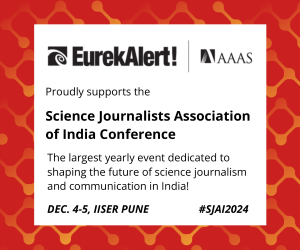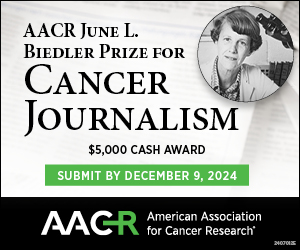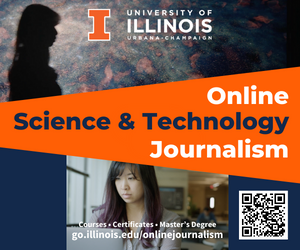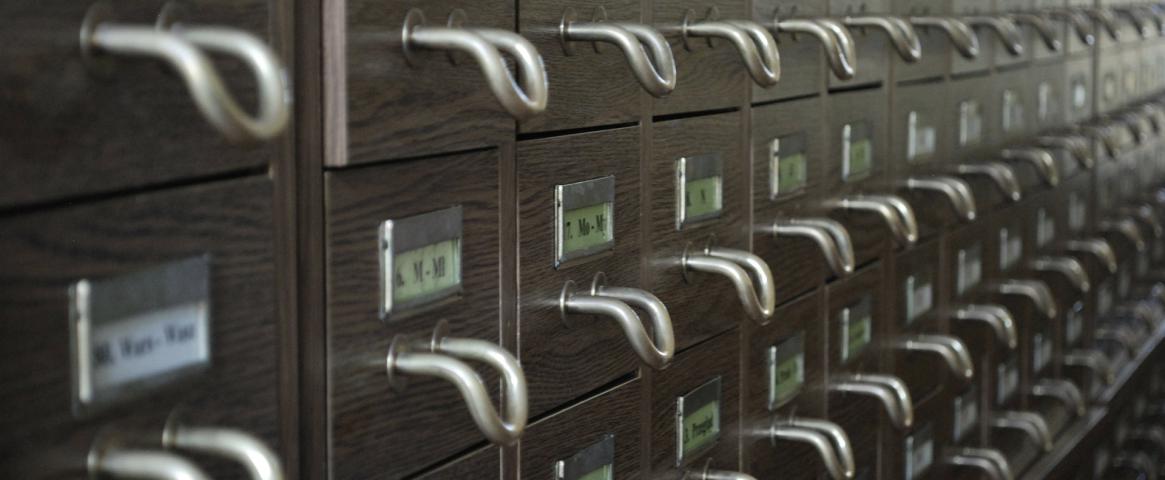
Information Access Standards
The standards presented here are primarily intended to guide interactions between journalists and public information officers (PIOs) and sources at federal science agencies. NASW supports their use for any institution using federal funding or that acts in the public interest. In addition, we hope these standards may provide guidance for journalists' interactions with PIOs and sources at other types of institutions.
These standards were developed over the course of a 1.5-day "Information Access Summit" held October 16 and 17, 2018, at George Washington University under the auspices of the National Association of Science Writers (NASW) and through a subsequent editing and review process. Both journalists and public information officers contributed to the drafting and review of these standards, and they were approved by the NASW board on March 3, 2019.
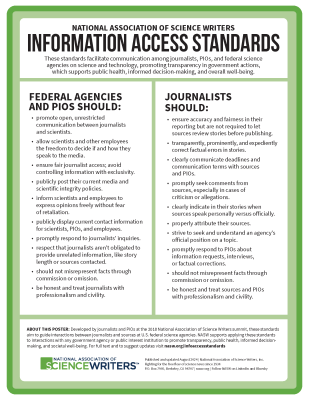 An abridged poster version of the Information Access Standards is now available as a printable PDF. Free to download and share — NASW membership not required. Print it out for your newsroom, communications office, or classroom! Gratitude to 2024 NASW Info Access Committee chair Teresa Carey for editing this first edition of the poster.
An abridged poster version of the Information Access Standards is now available as a printable PDF. Free to download and share — NASW membership not required. Print it out for your newsroom, communications office, or classroom! Gratitude to 2024 NASW Info Access Committee chair Teresa Carey for editing this first edition of the poster.
- Download Poster (August 2024 Version): NASW Info Access Standards Poster.pdf (36 KB)
Have suggestions or feedback for the poster or the Info Access Standards? Want to join the NASW Info Access Committee to help improve and update these resources for our community? Email the committee chair at infoaccess@nasw.org.
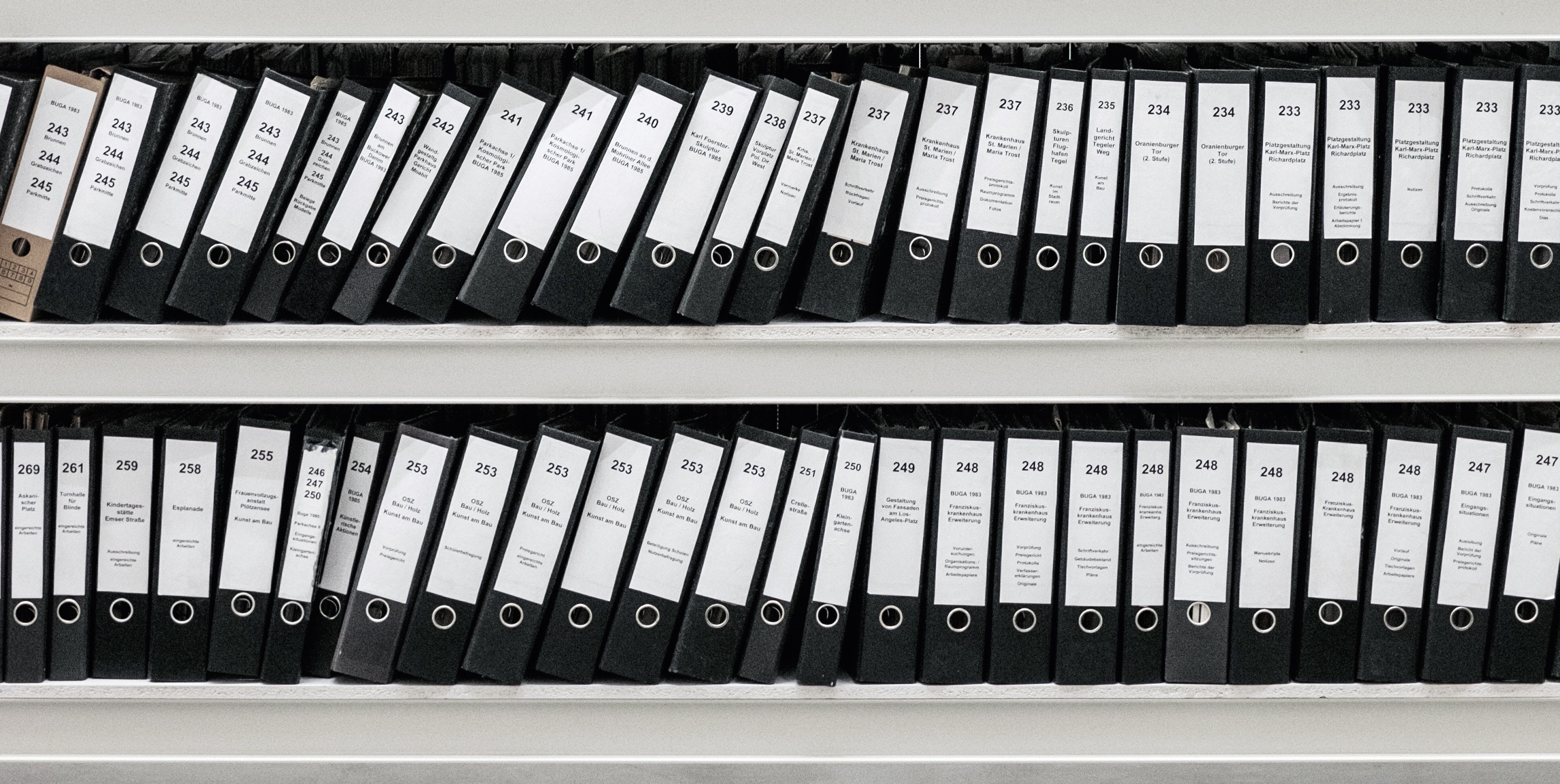
Preamble
The accurate and timely communication of scientific information is essential to creating a just society and an informed and literate public. We at the National Association of Science Writers have created guidelines to foster the transparent and open exchange of information about science and technology generated, funded, or used by government entities. Such an exchange will help promote the health and well-being of the public by enabling people to make the best decisions for themselves, their families, and their communities, and promote the public's right to know how its government operates. This exchange relies fundamentally on journalists' having open and unrestricted access to sources within government.
We encourage science journalists and public information officers to use the following principles and standards to guide their work in serving the public interest.
Definitions and roles
Journalist: Anyone engaged in the editorially independent reporting of news or information for the public.
Public information officer (PIO): Anyone employed by an agency for the purposes of disseminating information to the public or facilitating interactions between agency employees and journalists.
Source: Anyone whose comment is sought by a journalist for the purposes of reporting news or information.
Principles
Truth: Science is a powerful mechanism for pursuing truth and producing knowledge. The public is entitled to scientific information.
Accuracy: Scientific information is valuable to the extent that it is conveyed accurately, with appropriate context, and without hype, exaggeration, slant, or omission.
Transparency: The public has a right to know what is happening inside taxpayer-funded agencies.
Accountability: The public requires access to information to evaluate the actions and decisions of public agencies and officials.
Openness: Granting full and equal access to all journalists best promotes the public's ability to know.
Respect: Journalists and PIOs deserve respect, in recognition of the fact that both play valuable roles in communicating scientific information to the public.
- Value of journalists in society: Journalists are a crucial independent source of information about the government, including science produced, funded, or used by government entities. Dynamic and unrestricted reporting is fundamental to allowing journalists to produce the most informative and comprehensive stories possible.
- Value of PIOs in society: PIOs play important roles in facilitating journalists' access to government sources, and in providing critical information to journalists and the public.
Public service: Journalists and PIOs work on behalf of the public, not just the institutions that employ them.
Information Access Standards
1. Standards for federal agencies and public information officers
Journalists should have direct, unrestricted access to sources in the federal government.
PIOs and federal agencies should encourage direct and unfettered communication between journalists and scientists.
Sources should have the freedom to choose whether to speak to the media and the terms of any communication, including whether a PIO is involved in interviews.
Terms of the communication should be clear, with the default assumption that communications with journalists are on the record unless both parties agree otherwise.
Agencies and PIOs should provide access to journalists in ways that are fair and transparent. Agencies and PIOs should not use exclusive access as a way to control or restrict the free flow of information, or to reward or punish particular outlets or journalists.
Federal agencies should create and follow media and scientific integrity policies that are up-to-date and in keeping with the principles outlined here. These policies should be clearly communicated to all personnel and should be made publicly available.
Federal agencies should clearly inform scientists and other employees that they have a right to express their personal opinions, including to the media, without fear of retribution or punishment.
Agencies should publicly display on their websites work contact information for scientists, PIOs and other employees. When possible, agencies should additionally publicly display information about employee expertise and organizational charts, so that journalists can understand roles and chains of command within agencies. Such information should be kept as up-to-date as possible.
2. Standards for journalists
Journalists have an obligation to ensure accuracy and fairness, but do not have an obligation to offer sources the opportunity to review stories or quotes before publication.
Journalists have an obligation to transparently, prominently, and expediently correct factual errors in stories.
Journalists should communicate clearly with sources and PIOs about deadlines, when applicable.
Journalists should seek comment from sources in a fair and timely way. Seeking official comment is particularly important in cases involving criticism or allegations of wrongdoing.
Journalists should make clear in their stories when sources have specified that they are speaking in their personal rather than their official capacity.
Journalists should properly attribute their sources.
Journalists should strive to seek and understand an agency's official position on a topic or issue, when applicable.
3. The journalist-public information officer relationship
Journalists and PIOs should treat one another with professionalism and civility.
PIOs should respond promptly to journalists' inquiries. Journalists should in turn respond promptly to PIOs who are responding to a journalist-initiated request for information or an interview, or who are providing factual corrections to a published story.
Journalists need not, however, provide information to PIOs that is unrelated to a particular informational or interview request (e.g. the length or scope of a story, information about other sources contacted or information gathered, etc.).
PIOs should be honest toward journalists. Journalists should be honest toward PIOs.
Journalists and PIOs should not misrepresent facts through commission or omission.
Appendices
Appendix 1: Federal agencies' media policies
The following is a list of media policies of federal agencies that engage in science-related activities. Only agencies with policies accessible online as of the publication of this document are listed. (In many cases, media policies are integrated into broader scientific integrity policies.)
- Bureau of Land Management: See Department of Interior
- Centers for Disease Control and Prevention: See Department of Health and Human Services
- Consumer Product Safety Commission:
- Department of Agriculture: Departmental Regulation, Subject: Scientific Integrity (2016)
- Department of Commerce: Public Communications Policy (2008)
- Department of Education: Scientific Integrity Policy (2014)
- Department of Energy: Scientific Integrity Policy (2017)
- Department of Health and Human Services: Guidelines on the Provision of Information to the News Media (2017)
- Department of Homeland Security: Scientific Integrity (2012)
- Department of Interior: Public Communications Policy (2012)
- Department of Justice: Scientific and Research Integrity Policy (not dated)
- Department of Labor: Scientific Integrity: Statement of Policy (not dated)
- Department of State: Scientific Integrity (2018)
- Environmental Protection Agency: Scientific Integrity Policy (2012)
- Federal Energy Regulatory Committee: Media Relations Division (2013)
- Food and Drug Administration: See Department of Health and Human Services
- National Aeronautics and Space Administration: NASA Release of Information to News and Information Media (not dated)
- National Institutes of Health: See Department of Health and Human Services
- National Institute of Standards and Technology: See Department of Commerce
- National Oceanic and Atmospheric Administration: See Department of Commerce
- Nuclear Regulatory Commission: Guidelines for Interviews with the Media (2004)
- National Science Foundation: NSF Public Communications and Media Policy (not dated)
- United States Agency for International Development: Scientific Integrity Policy (not dated)
- United States Fish and Wildlife Service:
- FWS Public Communications Policy (2015)
- See also Department of Interior
- United States Forest Service: See Department of Agriculture
- United States Geological Survey: USGS Manual, section 500.5: News Release and Media Relations Policy (2015)
- See also Department of Interior
Appendix 2: Relevant codes of ethics
While NASW has not officially endorsed the codes of ethics below, we present them as examples of other professional organizations' efforts to address issues similar to those addressed by these standards.
- Society of Professional Journalists Code of Ethics
- Public Relations Society of America Code of Ethics
Additionally, NASW has created a Code of Ethics for Science Writers.
Appendix 3: 2018 Information Access Summit Announcement: Agenda, speakers and organizers
Calling all science journalists and federal agency public information officers:
We all want to share information about science with the public. But too often we end up in opposition, when journalists want more access to sources and information than PIOs are able to provide.
NASW is hosting an Information Access Summit to identify solutions. Inspired by previous successful dialogues, we aim to work together to increase science journalists' access to information and sources inside federal agencies. We will also explore how PIOs can develop and sustain open media policies at their agencies. At the conference, panels of veteran journalists and PIOs will share their needs, experiences, and constraints. Then we will have an open discussion. Ultimately we will draft a set of NASW-endorsed guidelines that both agencies and PIOs can refer to for support of open media policies at federal science agencies as well as state and local agencies, corporations, universities, and nonprofits.
All science journalists and PIOs are invited to attend. We would like to have a range of perspectives and experiences represented. This is, obviously, an experiment. But with an open and inclusive dialogue and commitment to collaboration, we believe we can make progress toward a more accessible government and better informed public. Register for this workshop via the ScienceWriters2018 conference registration. You do not need to register for the conference to attend the summit.
Cost: $15 (includes breakfast and lunch)
Schedule
- Tuesday, October 16, 2018
- 8:30-9:15 a.m. Opening plenary. Speaker: Rick Weiss, SciLine/AAAS
- 9:30-10:45 a.m. Panel 1: Journalists' experiences. Confirmed speakers: Laura Helmuth, Washington Post; Corbin Hiar, E&E News; Zahra Hirji, Buzzfeed; Charles Seife, freelance/NYU. Moderator: Robin Marantz Henig, freelance.
- 11 a.m.-12:15 p.m. Panel 2: PIOs' experiences. Confirmed speakers: Jared Adams, DARPA; Monica Allen, NOAA; Bob Jacobs, NASA; Renate Myles, NIH. Moderator: Ross Simons, Simons and Associates.
- 12:15-1 p.m. Lunch
- 1-2:45 p.m. Small-group discussion
- 3:15-5 p.m. Large-group discussion
- Wednesday, October 17, 2018
- 8:30 a.m.-12 p.m. A focused session to draft a set of NASW-endorsed guidelines that both agencies and PIOs can refer to for support of open media policies at federal science agencies as well as state and local agencies, corporations, universities, and nonprofits. Moderator: Ross Simons, Simons and Associates
LOCATION: Marvin Center (800 21st Street NW) Room 309
SPEAKERS:
- Jared Adams, DARPA
- Monica Allen, NOAA
- Laura Helmuth, health, science and environment editor, the Washington Post
- Corbin Hiar, E&E News
- Zahra Hirji, Buzzfeed
- Bob Jacobs, NASA
- Renate Myles, National Institutes of Health
- Charles Seife, freelance/New York University
- Rick Weiss, SciLine/AAAS
MODERATORS:
- Robin Marantz Henig, freelance
- Ross Simons, Simons and Associates
ORGANIZERS:
- Brooke Borel, journalist and author
- Teresa Carey, freelance multimedia journalist
- Cathy Clabby, the Reporters' Lab, Duke University
- Liza Gross, independent journalist
- Laura Helmuth, health, science and environment editor, the Washington Post
- Robin Marantz Henig, freelance
- Gabriel Popkin, freelance science writer
- William G. Schulz, freelance
- Charles Seife, freelance/New York University
- John Travis, Managing news editor, Science
